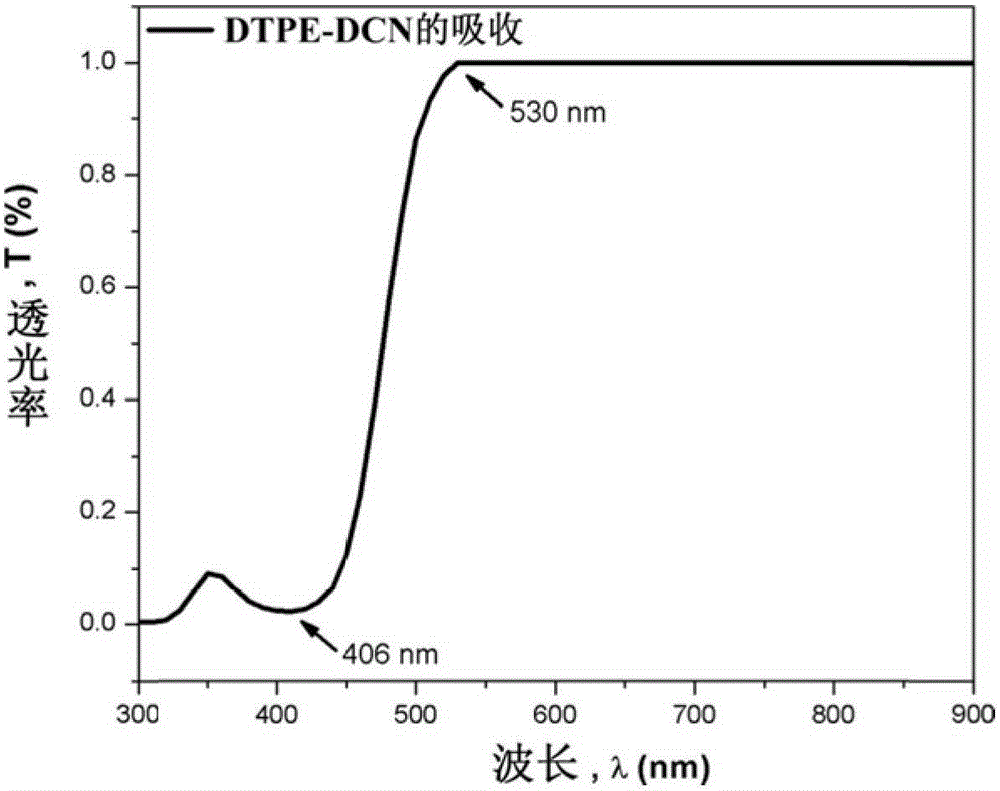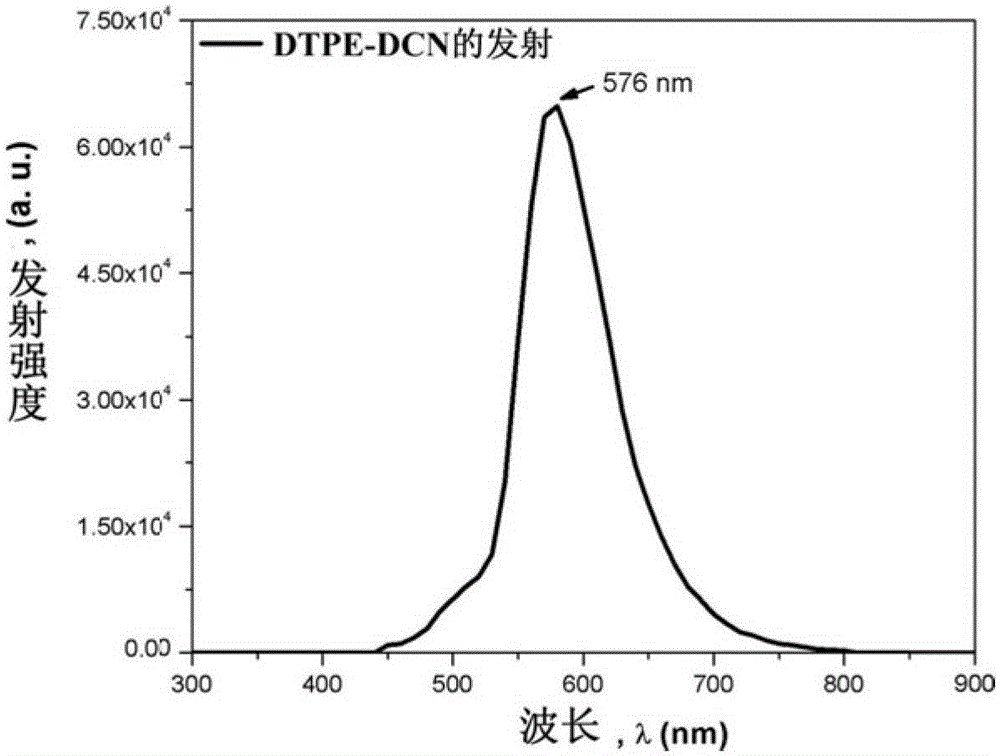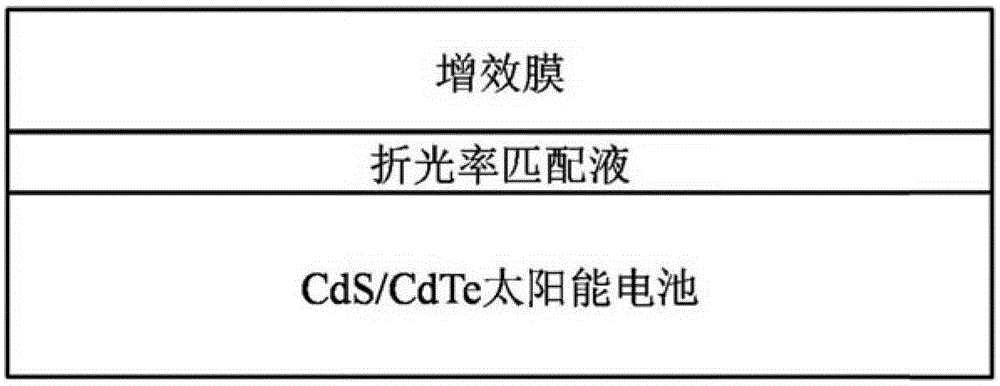Wavelength transfer material and its preparation method and application
A wavelength and application technology, applied in the field of wavelength transfer materials and its preparation, can solve the problems of aggregation-state fluorescence quenching and inability to completely absorb photons, etc., and achieve the effects of improving efficiency, widening the absorption range, and expanding absorption
- Summary
- Abstract
- Description
- Claims
- Application Information
AI Technical Summary
Problems solved by technology
Method used
Image
Examples
Embodiment 1
[0050] This embodiment relates to a wavelength transfer material and a preparation method thereof for CdS / CdTe solar cells, including the following steps:
[0051] Step 1, Synthesis of Aldehyde Tetraphenylethylene (TPE-CHO)
[0052]
[0053] Bromotriphenylethylene (1.0g, 3.0mmol), aldehyde phenylboronic acid (895mg, 6.0mmol), [1,1'-bis(diphenylphosphino)ferrocene]palladium dichloride (109mg, 5mol%) and potassium carbonate (2.1g, 14.9mmol) were added to 50mL of a mixture of methanol and toluene in an equal volume ratio, heated to 75°C, and stirred for 16 hours; the reaction solution was cooled to room temperature, filtered, and evaporated under reduced pressure Solvent, the crude product was purified by column chromatography using n-hexane / dichloromethane (2:1 volume ratio) as the mobile phase and silica gel as the stationary phase to obtain 976 mg of a light yellow solid with a yield of 91%;
[0054] Step 2, Synthesis of Tetraphenylethylenemalononitrile (TPE-DCN)
[0055]...
Embodiment 2
[0059] This embodiment relates to a wavelength transfer material and a preparation method thereof for a CdS / CdTe solar cell. The method includes the following steps:
[0060] Step 1, Synthesis of Bromotetraphenylethylene (TPE-Br)
[0061]
[0062] Dissolve benzylbenzene (2.0g, 11.9mmol) in 20mL of anhydrous tetrahydrofuran, stir at 0°C under nitrogen protection, slowly add 1.6M n-butyllithium n-hexane solution (7.4mL, 11.9mmol), react for 30 minutes; then add 4-bromobenzophenone (3.1g, 11.9mmol), slowly warm up to room temperature, continue to stir the reaction for 6 hours, then add a small amount of water to the reaction solution to stop the reaction, and the reaction solution is extracted with dichloromethane for two Next, the organic layer was dried with anhydrous magnesium sulfate, filtered, and the solvent was evaporated under reduced pressure. The obtained solid was dissolved in 80 mL of toluene, and hydrated p-toluenesulfonic acid (500 mg, 2.6 mmol, catalyst) was add...
Embodiment 3
[0074] This embodiment relates to a wavelength transfer material for CdS / CdTe solar cells and a preparation method thereof, the method comprising the following steps:
[0075] Step 1, Synthesis of Dibromotetraphenylethylene (TPE-DBr)
[0076]
[0077] Add 4-bromobenzophenone (5.0 g, 19.1 mmol) and zinc powder (2.5 g, 38.3 mmol) into 50 mL of tetrahydrofuran, add 1M titanium tetrachloride toluene solution (21.1 mL, 21.1 mmol), and heat Reflux, stirring and reacting for 20 hours, the reaction solution was cooled to room temperature, filtered, and the solvent was evaporated under reduced pressure. The crude product was purified by column chromatography using n-hexane as the mobile phase and silica gel as the stationary phase to obtain 2.7 g of a white solid with a yield of 57%;
[0078] Step 2, Synthesis of Dialdehyde Tetraphenylethylene (TPE-DCHO)
[0079]
[0080] Dissolve TPE-DBr (1.0g, 2.0mmol) in 50mL of anhydrous tetrahydrofuran, stir at -78°C under nitrogen protecti...
PUM
| Property | Measurement | Unit |
|---|---|---|
| thickness | aaaaa | aaaaa |
| spectroscopy | aaaaa | aaaaa |
Abstract
Description
Claims
Application Information
 Login to View More
Login to View More - R&D
- Intellectual Property
- Life Sciences
- Materials
- Tech Scout
- Unparalleled Data Quality
- Higher Quality Content
- 60% Fewer Hallucinations
Browse by: Latest US Patents, China's latest patents, Technical Efficacy Thesaurus, Application Domain, Technology Topic, Popular Technical Reports.
© 2025 PatSnap. All rights reserved.Legal|Privacy policy|Modern Slavery Act Transparency Statement|Sitemap|About US| Contact US: help@patsnap.com



